The nouveau black dirt
On 14 acres, a mother-daughter food powerhouse cultivate a modern slice of southwest France. Now if only they can get a permit.
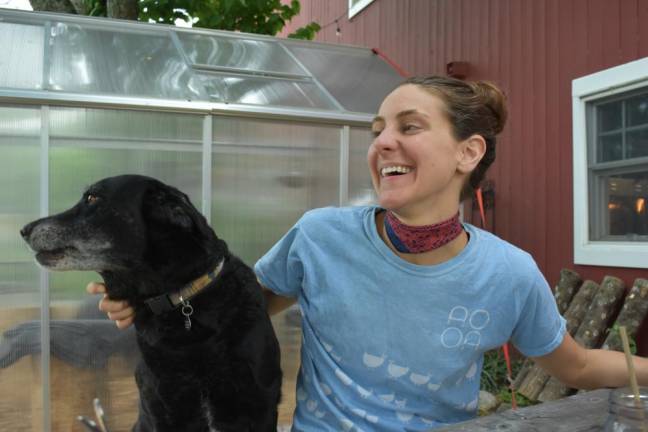
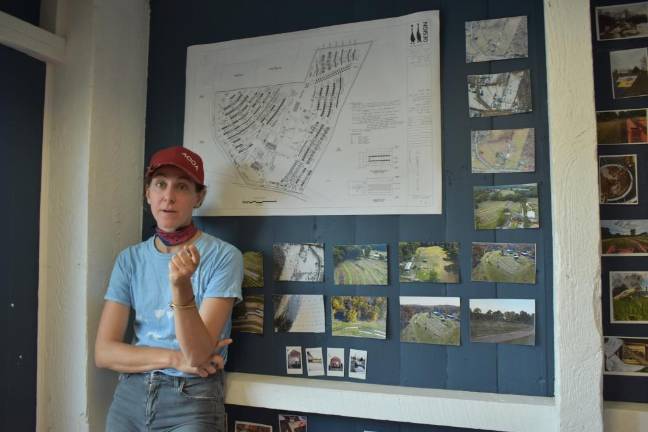
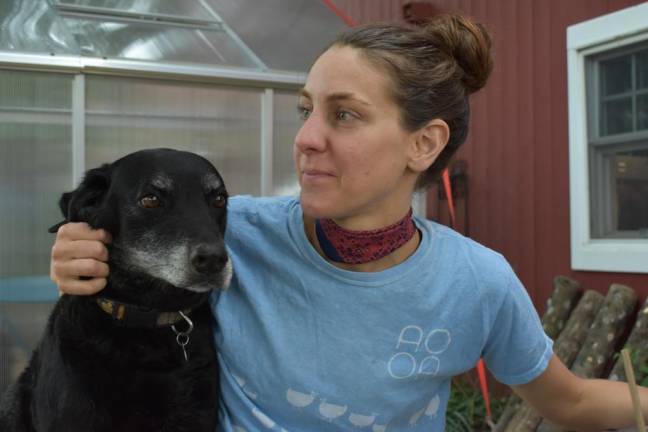

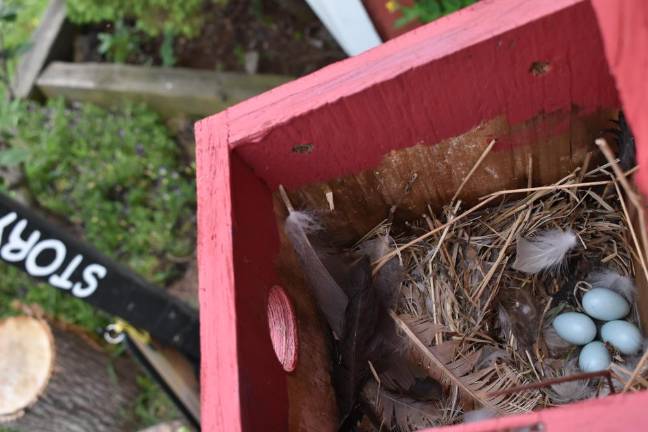
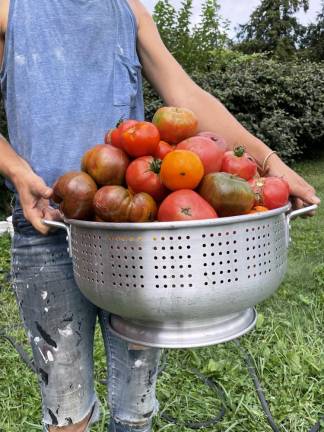
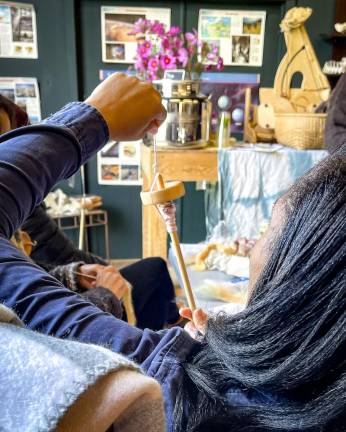
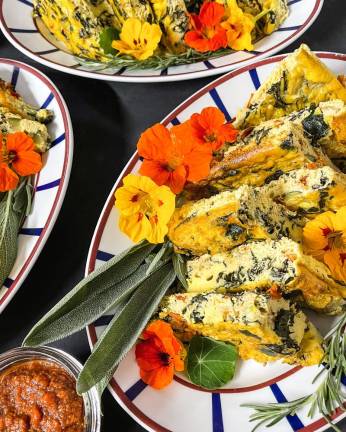
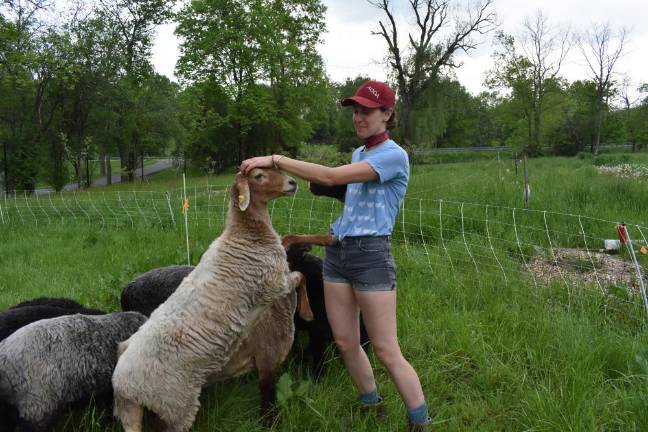
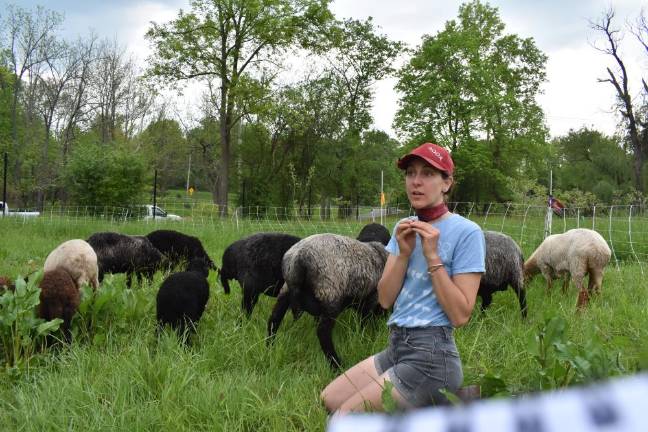
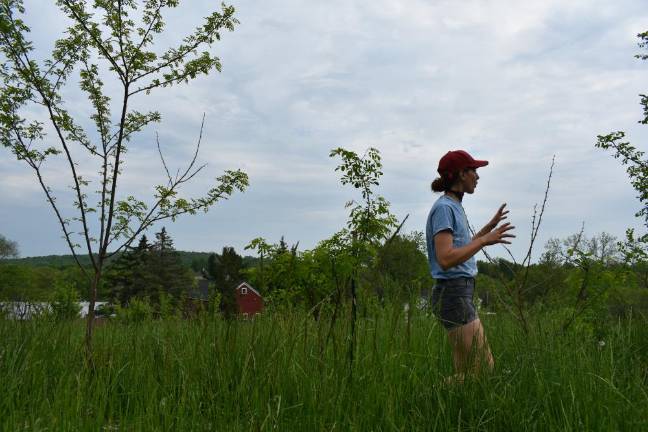
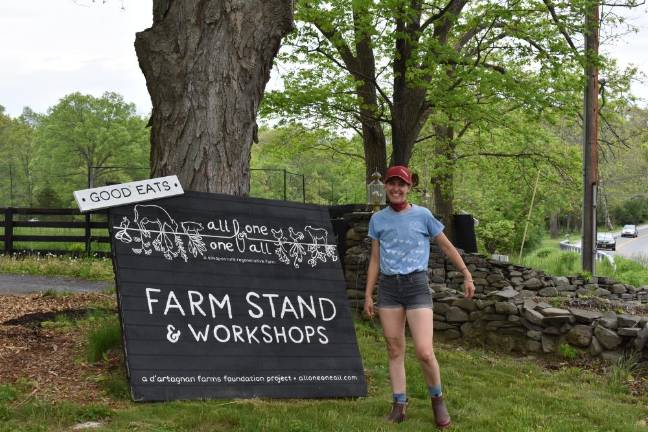
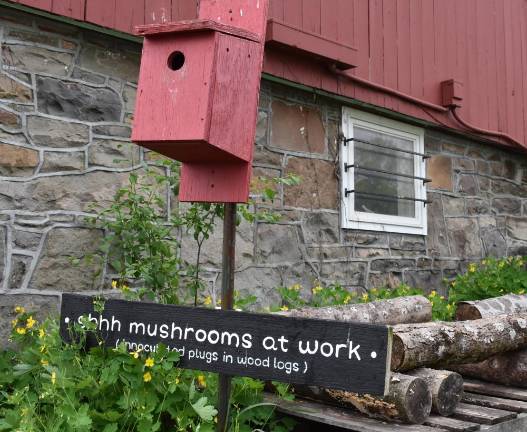
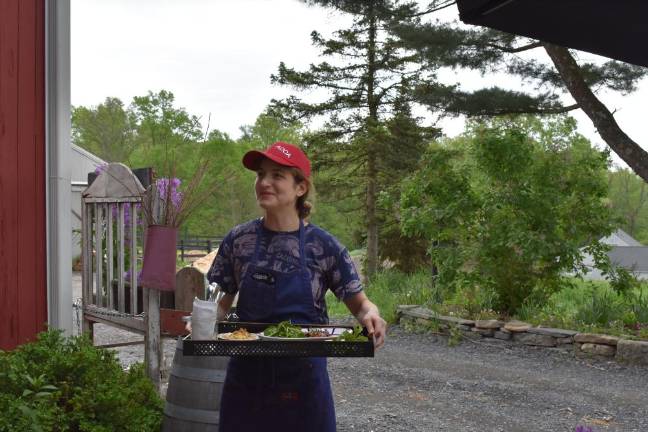
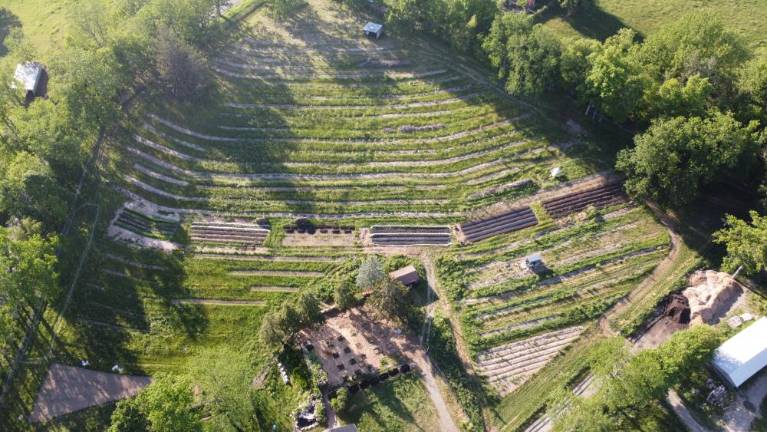
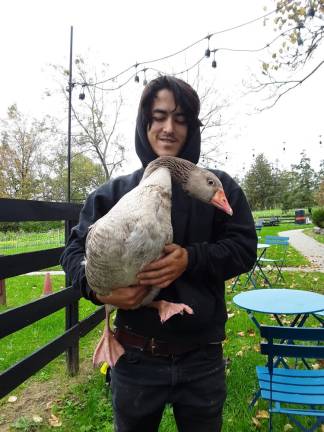
Springtime on a farm always feels like a race. Here, it’s a full-on sprint. The moment Alix Daguin materialized in the barn of AOOA Farm in Goshen, NY, I knew my pen would not be able to keep pace. Before she’d finished her first sentence, I’d pulled my recorder out of my back pocket – a catchall for the colorful details coming at me rat-a-tat-tat as I trailed Alix’s quick stride around the farm.
The only time Alix, 33, paused over the course of the afternoon was when I mangled her name: “You must be Alex.” For a split second she was struck dumb, before she re-animated and replied: “Alix” (pronounced Aliks).
Duh. She is, of course, French as the day is long. Though American-born, her mother’s native dialect was Alix’s first language. She can map her ancestry back eight generations, her family a veritable food dynasty from the Gascony region of southwest France, “where the main products are duck and Armagnac. And that’s it,” she said, with her signature blend of bluntness and humor. Alix was raised by her mother, Ariane Daguin, who immigrated to New York at 20 and went on to found D’Artagnan, a top purveyor of organic meats and charcuterie.
“Where my family’s from, you see where your food comes from. They’re still linked to the processes and the way food comes into the town. People aren’t buying chicken nuggets at the market, there’s live birds at the market. Death is part of food and it’s seen there. There’s no rectangular shaped food, so it’s legible, so you make better decisions about it.”
With the proceeds from D’Artagnan, the mother-daughter pair decided three years ago that it was time to team up and write the next chapter of the Daguin family food saga together. “I’m an only child, and my mom’s a single parent,” said Alix. “In my mom’s life there’s D’Artagnan and there’s me. We’ve always talked about doing something. I was like you know, it’s now or never.”Alix’s vision for the farm is simple. One: to revive that “feeling around food and agricultural and it being in daily life,” she said. And two: “For it to be financially sustainable and not hemorrhaging money all the time.”
The duo formed D’Artagnan Foundation, an educational nonprofit, and bought this historic property, previously a horse farm and dog boarding facility, for $1.3 million in 2019. Alix lives in the 19th century farmhouse, and Ariane, who runs D’Artagnan during the week, comes up from the city to help on weekends.
“We worked our asses off the first two years, even now. And that’s kind of why I’m talking so fast, too,” said Alix. She’d gone back to France for a family obligation the week before, the first time in two years that she’d been away from the farm.
Alix has emphatically settled down, leaving behind her globetrotting lifestyle and embracing the rhythms of farm life. Her collection of escapades to date is so epic, it seems like her life’s story must belong to a much older woman. There was the year rock climbing in Spain with her boyfriend; the year studying philosophy of human nature and Arabic and French literature at Fordham; the bicoastal career as an architect designing houses that she herself could never afford to live in; the side gig building a five-story, 52-unit unit of nested hexagons to house Burning Man festival-goers; the stint competitive fly fishing in Oakland. These days, her adventures are limited to early morning outings with her “bike gang” and salsa classes in the barn. All her competitive juices are focused on making this farm sustainable.
Alix’s architecture background has come in handy these two years. Not only does she stay up late drawing farm blueprints and creating planting calendars in Excel, Alix thinks nothing of welding rotted-out horse trailers to make movable chicken coops or hand-lettering the charming farm signs that dot the property. Together with Eli Roberts, a Yale-trained forester who found her through a Craigslist ad, she designed an ambitious silvopasture system, in which trees and livestock are raised together to the mutual benefit of each. To orient the planting beds, they mapped the topographical lines using a tube with water. Then they trucked in compost and planted nearly 2,000 perennials in alleys, comprised of some 600 different species. “Trees are an investment,” said Alix, recalling the mad dash of those early days. Orchard trees have a three- to seven-year lead time until they bear fruit. “We’ve gotta get these in the ground. If we’re not done prepping the ground, I don’t care, we’re getting them in.”
Known as alley cropping, the farm’s design features primary rows of slow-growing trees – cherries, crabapples, peaches, chestnuts, pawpaws, beech plums, quinces and persimmons – alternating with secondary rows of fast-growing fodder trees and shrubs like black locust, false indigo, hybrid poplar, red mulberry and white mulberry. This latter category is grown to be munched by the farm’s herd of 13 karakul sheep, an ancient breed that’s now endangered. Their hearty wool is for sale in the little farm shop. “We’re working on a permit for a creamery, because these guys make the best yogurt,” said Alix, who milks the sheep herself. “I don’t want to say in the world, because that’s pushing it, but we’ve done tests, in house, da-da-da, and it was just like, we gotta do this.”
A few days after the sheep come through, the chickens follow, spreading the sheep manure and picking out bugs. Pictures show the overgrazed fields of two years ago are now striped in lush shades of green.
Chef Beth Goodwin, dressed in a blue apron and red ball cap emblazoned with AOOA, brought lunch out on a tray as we wrapped up the tour. Goodwin met Alix at Cornell, where they were fellow members of a underground dining club, and went on to train at Chez Panisse before returning to man the kitchen here. “I think when people come here and they taste like a crème caramel made with pastured eggs that have been fed with vegetable scraps, it makes it that much more likely that they change some kind of habit or they incorporate that into their lifestyle, and that’s the goal,” said Alix. “That’s the only goal.”
We sat at a picnic table under an umbrella as the overcast sky opened up above us, bringing a welcome rain. I dug in on a spread that could have fed a family: a frittata with wild dock greens and ventrèche (that’s French pancetta), pickled daikon radish with sea salt and butter, chrysanthemum greens, edible flowers and beet salad with a creamy mustard vinaigrette. Then coco mousse, the aforementioned crème caramel and a berry and cardamom cream popsicle made with local dairy and the farm’s free-range eggs. And to wash it all down, a black currant fizz.
Alix folded her long legs under the picnic table, sipping her own fizz from a Mason jar and toying with a stalk of wild garlic she’d foraged in the field. An old dog jumped up to sit beside her. Not everyone in town is excited about the arrival of this experimental farm with its whiff of superiority, run by city folks who want to open a 100-seat restaurant in what has always been peaceful farm country. That part took Alix by surprise, and though she brushes it off, her eyes shine with moisture each time she alludes to the neighbors’ opposition. She’d assumed that a town that takes such pride in its rich agrarian roots would understand what she was trying to do, heck, even be psyched about it. “That’s why we looked here,” she said, “and not upstate more where land is cheaper.”
Au contraire. One neighbor didn’t like the tree protectors that collared the young trees to protect them from voles, saying her fields looked like a graveyard. Another complained that the animals were too loud. Some said she was trying to squeeze too many different things onto a postage stamp of land. “We still get letters of hate from neighbors,” said Alix. “Somebody on the planning board said we don’t want any tent cities here. This is some hippie bull****. You’re a backyard science project,” she ticked off the rebuffs. “I went to school upstate, nearby, but I’m not from here – so I get it. I’m not from here. English isn’t my first language. I’m young, I’m annoying, I’m a woman, we’re doing a farm.”
The Daguins applied for a permit to convert the 4,327-square-foot barn into a restaurant and farm stand in September of 2020. Getting permits was what Alix used to do professionally, “and I was good at it,” she said. “It wasn’t multi-programmatic, it wasn’t this much stuff going on, it was residential houses or a Montessori school or a library or a pet camp. But I thought we’d get a permit in a year, not even. In my head it was six to eight months, eight months if I suck at my job, six months if I’m working hard, you know?” Four planning board appearances and 21 months later, they still don’t have the permit. Alix is hopeful that the latest rounds of revisions – which have included making the upstairs of the barn ADA accessible and planting two rows of evergreens along the property line – will be the last. She has abandoned certain elements, like a septic system that incorporates red wiggler worms, ceding to the board’s preference for a conventional system.
“It’s insane to me that it’s blowing their mind. I mean, if we were doing this in France, if we were doing this in Italy, where agrotourism is a thing, this wouldn’t be difficult,” she said. “Or if we were the Rockefeller Foundation and we were going to do Stone Barns, this wouldn’t be difficult, either.”
In the meantime, the farm has been hosting on-farm workshops from indigo dyeing to embroidery to making fermented hot sauce; bringing in big-name chefs like Helene Darroze, known for Michelin-starred restaurants in London and Paris, who led a demo on preparing eggs in cocotte, and selling a limited seasonal menu from the “farm stand canteen.” The open door policy is not just a central tenet here, it is the farm’s raison d’etre. The collaborative spirit that inspired the farm’s name – from the Three Musketeers’ “All for one and one for all!” – is in evidence everywhere.
During my visit, a landscaping crew rolled in not once but twice with a truckload of woodchips. Alix barters eggs, or salad greens, or a popsicle when they bring mulch; suffice to say she’s got a lot of mulch. During lunch, our mile-a-minute conversation trailed off as two massive, matching black SUVs pulled up. We waited expectantly for some high rollers to appear, and chuckled as instead, Boy Scouts tumbled out, come to volunteer.
“The whole point is we will use any excuse to get people here, be it one day with the restaurant, one day with awesome liquors because I hope to have a little distillery here, with the yogurt one day when we have that license, with the farm stand, with ‘My Grownup & Me,’ with whatever workshops, whatever, I don’t care,” said Alix. “I want to get people here so that they can see that agriculture can be a tool for good, or not. It can destroy, or it can make the environment a better place, make you healthier. It can replenish aquifers, it can sequester carbon, it can actually produce food that has more nutritional value.”
But the restaurant is the capstone of the vision, the path to making the farm financially self-sufficient, which is why the delay has been so painful. Ariane, who is bankrolling the operation, is more than $2.5 million in the hole, estimates Alix, including the property purchase and the growing expense of the salaries of the crew. “It is a race, you know? I talk fast and I’m amped up about it because, like, we’re going to need to fundraise soon, or...” she shook her head. “This needs to be sustainable at one point.”
What will happen if they don’t get the permit soon? She brushed that line of thinking right off the table.
“That’s not even a question in my head. I need to get a restaurant, I need to get a distillery,” she said. “I’m not doing anything else with my life. Like – nothing. I’ve broken up with all the boyfriends. I used to rock climb, I don’t do that anymore. I used to sing in a band, I don’t do that anymore. I used to go out salsa dancing and swing dancing. I don’t do anything anymore,” she said. “This is my dream.”